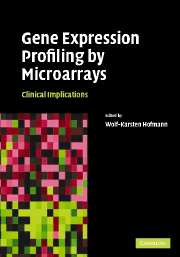Book contents
- Frontmatter
- Contents
- List of contributors
- Foreword
- Introduction
- 1 Technique of microarrays: microarray platforms
- 2 Quantitative quality control of microarray experiments: toward accurate gene expression measurements
- 3 Statistical analysis of gene expression data
- 4 Genomic stratification in patients with heart failure
- 5 Gene expression profiling for the diagnosis of acute leukemias
- 6 Gene expression profiling can distinguish tumor subclasses of breast carcinomas
- 7 Gene expression profiling in lymphoid malignancies
- 8 mRNA profiling of pancreatic beta-cells: investigating mechanisms of diabetes
- 9 Prediction of response and resistance to treatment by gene expression profiling
- Index
- References
6 - Gene expression profiling can distinguish tumor subclasses of breast carcinomas
Published online by Cambridge University Press: 05 September 2009
- Frontmatter
- Contents
- List of contributors
- Foreword
- Introduction
- 1 Technique of microarrays: microarray platforms
- 2 Quantitative quality control of microarray experiments: toward accurate gene expression measurements
- 3 Statistical analysis of gene expression data
- 4 Genomic stratification in patients with heart failure
- 5 Gene expression profiling for the diagnosis of acute leukemias
- 6 Gene expression profiling can distinguish tumor subclasses of breast carcinomas
- 7 Gene expression profiling in lymphoid malignancies
- 8 mRNA profiling of pancreatic beta-cells: investigating mechanisms of diabetes
- 9 Prediction of response and resistance to treatment by gene expression profiling
- Index
- References
Summary
Introduction
Breast cancer is known to be a heterogeneous and multifactorial disease, affecting approximately one in ten women in the Western world. While the majority of breast cancer patients respond to initial treatment (local and systemic), a large fraction of patients relapse over time and suffer through sometimes inefficient chemotherapeutic treatment regimens. A small number of biomarkers for targeted treatment exist, e.g., presence of the estrogen receptor (ER) is used to predict response to anti-estrogen treatment and patients whose tumors overexpress HER2/neu can be treated with Herceptin®. Nevertheless, little progress has been made when it comes to tailoring treatment and identifying novel therapeutic targets for the clinical management of breast cancer patients. With the advent of high-throughput genetic profiling techniques, simultaneous assessment of thousands of genes in single experiments is now possible, thereby augmenting the degree of complexity in genetic patterns that can be investigated, and increasing the likelihood of identifying potential therapeutic targets in primary breast carcinomas. Global gene expression profiling studies conducted over the last couple of years have shown that molecular profiling of breast cancers can be used to identify clinically and genetically significant subtypes of breast carcinomas [1–4] and subgroups of patients with different prognosis or disease outcome [5–7], and to predict therapeutic response to both endocrine and chemotherapeutic drugs [8–12]. Gene expression profiling may indeed become a general strategy for personalizing treatment choices and for predicting clinical outcome in individual patients in the not too distant future.
Information
- Type
- Chapter
- Information
- Gene Expression Profiling by MicroarraysClinical Implications, pp. 132 - 161Publisher: Cambridge University PressPrint publication year: 2006
References
Accessibility standard: Unknown
Why this information is here
This section outlines the accessibility features of this content - including support for screen readers, full keyboard navigation and high-contrast display options. This may not be relevant for you.Accessibility Information
- 1
- Cited by
